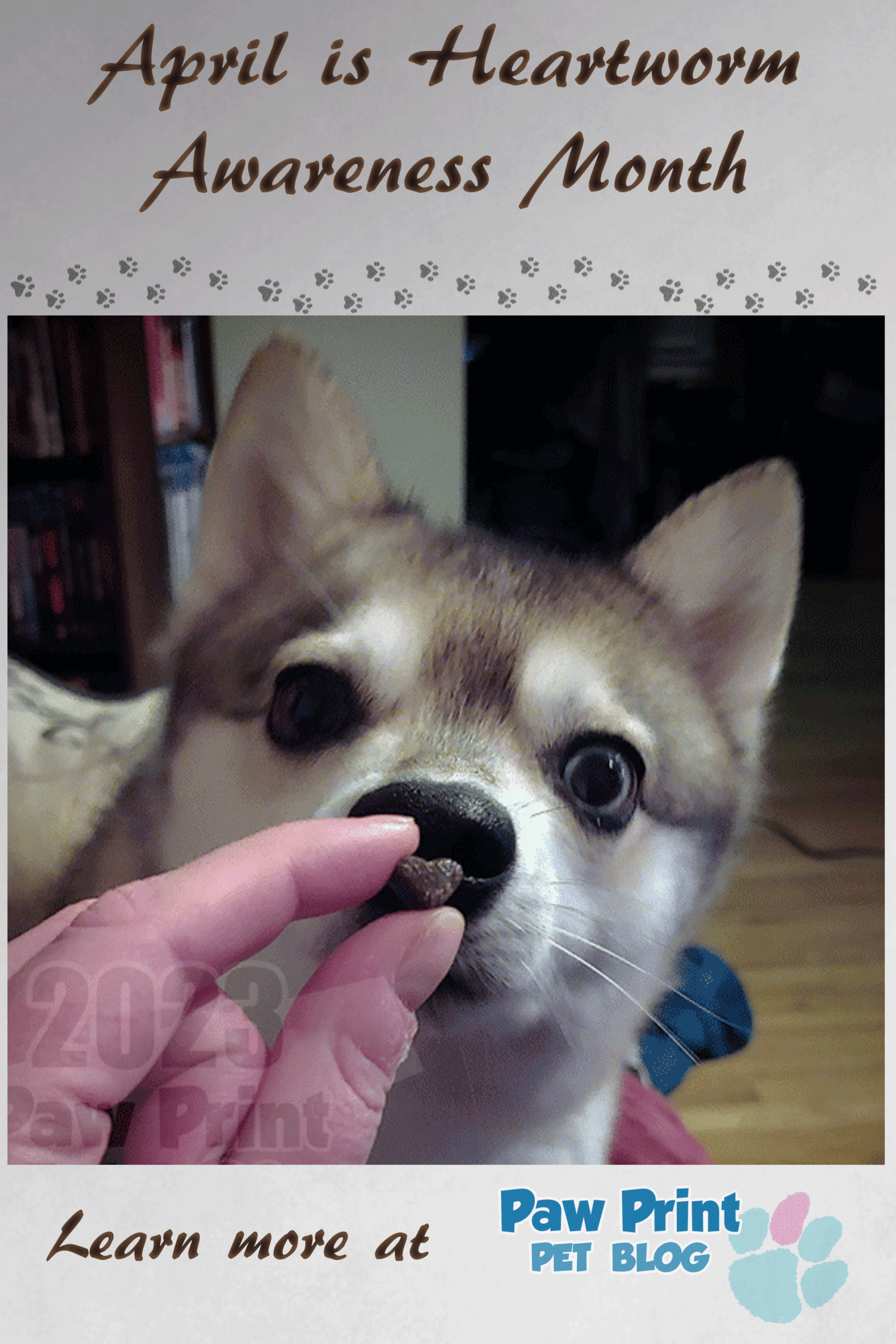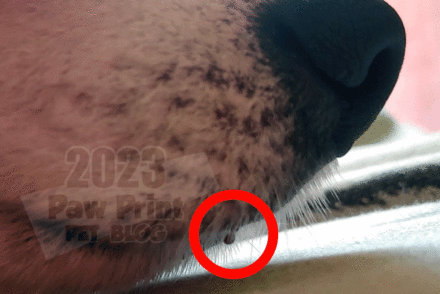April is National Heartworm Awareness Month. Did you know that not only dogs can get heartworms—but cats, and ferrets can too? Other animal species such as coyotes, wolves, foxes, sea lions and, very rarely, humans, can carry heartworms as well.
When I was in college, I had to dissect a cat. One thing that helped me get through it was the fact that they weren’t healthy cats who were killed for college dissections. They came from the local animal shelter, and either passed, or were put down, due to medical issues. My cat, as I quickly discovered, had passed away from complications due to heartworms. It’s one thing to see a picture of an animal’s heart infested with worms, and quite another to see it in person. Probably thanks, at least in part, to that experience, I’ve never felt comfortable forgoing heartworm prevention when it comes to my own pets.
Post Contents:
What, Exactly, Are Heartworms?
As their name suggests, heartworms are long, often described as spaghetti-like (if that doesn’t put you off eating spaghetti…) worms that can infest the heart, lungs, and blood vessels. Heartworms can be fatal, but short of killing our beloved pets they can also cause heart failure, organ damage, and lung disease.
 Dogs are a natural heartworm host. Inside a dog, heartworms are able to mature and reproduce. That means that in dogs, if left unchecked, heartworm numbers will steadily climb. The same is not true of cats. Cats are considered to be atypical heartworm hosts, meaning that, in cats, heartworms do not commonly mature and reproduce. That doesn’t mean, however, that they can’t still cause life-threatening complications, such as a condition known as heartworm associated respiratory disease. The treatment commonly given to dogs to eliminate heartworms is toxic, and cannot be used, in cats.
Dogs are a natural heartworm host. Inside a dog, heartworms are able to mature and reproduce. That means that in dogs, if left unchecked, heartworm numbers will steadily climb. The same is not true of cats. Cats are considered to be atypical heartworm hosts, meaning that, in cats, heartworms do not commonly mature and reproduce. That doesn’t mean, however, that they can’t still cause life-threatening complications, such as a condition known as heartworm associated respiratory disease. The treatment commonly given to dogs to eliminate heartworms is toxic, and cannot be used, in cats.
Signs of heartworm infestation in dogs include a mild but persistent cough, fatigue, reluctance to exercise, decreased appetite, and weight loss. Symptoms will progress if heartworm remains untreated, and could eventually include symptoms of heart failure, and fluid accumulation in the abdomen. In some cases, heartworms can cause blockages in the heart which can quickly become life-threatening. Symptoms in cats can be similar to those in dogs, including coughing, lack of appetite, and weight loss. Sometimes more dramatic symptoms such as vomiting, difficulty walking, fainting, seizures, and fluid accumulation can occur.
Ok, so heartworms suck, but how do pets get them in the first place?
Basically, heartworms are transmitted by mosquitoes. Female mosquitoes can carry microfilaria, or baby heartworms, that they pick up when biting a heartworm infested animal. These microfilaria develop into larvae inside the mosquitoes and are then passed on to new animals when the mosquitoes feed again. It takes up to 6 months for these larvae to mature inside their new hosts. Mature heartworms can live 5 to 7 years in dogs, and from 2 to 3 years in cats.
What can pet owners do to protect against heartworm?
If you take your dog in for regular yearly vet exams, you’ll probably be familiar with heartworm testing. This is an important yearly test, because the earlier heartworm is detected, the better your pets’ prognosis. Your vet will use a small amount of your dog’s blood to look for heartworm proteins. These tests can direct the presence of heartworm, often even before your pet begins to show any symptoms of infestation. Testing in cats is not quite as straightforward, because cats are generally less likely to be carrying adult heartworms. Your vet may use different tests, such as an antigen and antibody tests.
 Dogs who test negative for heartworms can be started on heartworm prevention. Preventives come in the form of spot-ons, injections, or pills. All forms of preventatives work by killing heartworm larva before they get the chance to mature. This is why it’s essential to adhere to a schedule when it comes to administrating heartworm preventatives. Once the worms molt past the larval stage, it’s much less likely they’ll be affected by preventatives.
Dogs who test negative for heartworms can be started on heartworm prevention. Preventives come in the form of spot-ons, injections, or pills. All forms of preventatives work by killing heartworm larva before they get the chance to mature. This is why it’s essential to adhere to a schedule when it comes to administrating heartworm preventatives. Once the worms molt past the larval stage, it’s much less likely they’ll be affected by preventatives.
Annual testing, even if your pet is on year round preventative, is important.
Something as simple as missing one dose of preventative can lead to heartworm infestation. Even for owners who adhere to their pet’s preventative schedule, it’s possible for pets to sneak off and spit out, or vomit, their pill. Preventatives are not always 100% effective.
Despite that, using preventatives are generally much safer, and cheaper, than heartworm infestation and treatment. According to the Companion Animal Parasite Council, 166,817 dogs tested positive for heartworm last year. Cases were reported in all 50 states. Don’t let your pet become a statistic—talk to your vet about what they recommend as heartworm preventative for your area. April, Heartworm Awareness Month, may be almost over, but it’s not too late to be proactive about your pet’s health care, if you haven’t been already.
We always love hearing from our readers, comment below! Do you currently use heartworm preventative for your pet(s)?

We’ve, unfortunately, been dealing with content scrapers stealing our articles lately. You shouldn’t be seeing this article on any site other than pawprintpetblog.com! If you’re reading this article on any other site, we’d love for you to take the time to contact us and let us know and, if you have the time, stop by and visit us on our official site! Thanks you.





12 Comments
Thank you for writing this article to remind everyone of the important of heart worm prevention.
When I was a kid we took in a stray off the streets. After taking him to the vet we discovered he had heart worms.
Although they were able to help him, the worms did a lot of damage to his heart. Plus the treatment was very expensive and harsh. We didn’t think he would make it through the treatment. Thankfully he did.
I’m so happy to hear he made it! The treatment is expensive and hard on our pets for sure. It’s one of the big reasons why prevention is so important. That’s awesome that your family took in a stray and helped him, despite him needing expensive heartworm treatment. I’m sure he felt so much better being heartworm free, and in a safe home!
Yup, Bella is tested and vaccinated every year for heartworm among other doggy diseases. So grateful to you for getting the word out on it. It sounds scary!
For sure. That’s awesome that you keep Bella protected. I’ve heard of the heartworm vaccine but never tried it for my own dogs. So far we’ve just stuck to using the monthly oral preventatives.
Interesting post but as I live in San Francisco and Layla does not leave the area my vet said she does not need this treatment phew as they have no problems here. I have read a lot about it though but trust the vet.
I haven’t heard that before, that’s interesting. Does your vet still test for them even though they don’t recommend preventative? They must not be as common there as other areas in the US.
Heartworm sounds a really nasty thing for a dog to get. I am glad there is an annual test as this has to be a big help for every dog owner. Can you imagine NOT having the test?
Yeah the thought of worms in my dogs’ hearts always kind of freaked me out. I’m sure it’s not a fun thing to go through. I’m glad they’re so easy to test for/prevent in dogs.
I can barely stand to look at the photos of heartworms at the vets’ office, I can’t imagine seeing it in person. We keep our dogs on heartworm preventative for 3/4 of the year, but our vet said with global warming, we may need to move to year-round prevention.
Yeah global warming sure is changing the weather in a lot of places! I’ve heard a lot of vets are starting to recommend year round preventatives because of the average temperatures rising.
Ah, yes, good reminder. I decided to use Heartworm preventive year round because we did see the odd mosquito even in the middle of Jannuary with temperatures way below zero. Which is crazy but it did happen.
It is crazy! The vets I’ve spoken too also recommend year round preventive, even though were we live now we get pretty cold winters. It only takes one mosquito though, and I think with global warming we’re starting to see more unusually warm weather.